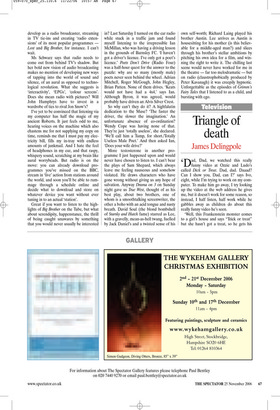Grim thoughts
Kate Chisholm
‘he medium needs glitz, it needs glam Tour, it needs an ego,’ read an ominously worded column in this week’s Radio Times, accompanied by a glamorous headshot of its author, the director of Channel 4’s new online-only radio station. A shiver ran down my spine. If we in radio want to compete with TV, says Nathalie Schwarz, then we need to start loving ourselves.
Anxious to find out what this group hug might involve, I rushed to my laptop and attempted to sign on to www.channel4radio.com. But my antiquated telephone line was unwilling to make a connection with this ‘edgy, bold, mischievous’ medium and refused to log me in. Even if you do have broadband, and can raise a response from those online controllers at Channel 4, you must first fill in an electronic form before being allowed to download. No stretching the arm out of bed as the alarm goes off, fumbling for the right button, and switching on to Terry or John or Chris to listen to Channel 4. Oh no. You are too much loved for that.
Why so? Well, they need to build up a huge list of active, registered users (can computer-loggers be called ‘listeners’ in the old-fashioned sense?) in time for the next round of bidding for Ofcom licences early next year. The government plans to allow the creation of a new national digital (DAB) ‘multiplex’ for commercial stations. Channel 4 hopes to win it so that it can develop as a radio broadcaster, streaming in TV tie-ins and creating ‘radio extensions’ of its most popular programmes Lost and Big Brother, for instance. I can’t wait.
Ms Schwarz says that radio needs to come out from behind TV’s shadow. But her bold new vision of audio broadcasting makes no mention of developing new ways of tapping into the world of sound and silence, of an aural as opposed to technological revolution. What she suggests is ‘interactivity’, ‘EPGs’, ‘colour screens’. Does she mean radio with pictures? Will John Humphrys have to invest in a wardrobe of ties to rival Jon Snow’s?
I’ve yet to be convinced that listening via my computer has half the magic of my ancient Roberts. It just feels odd to me, hearing voices on the machine which also chastens me for not supplying my copy on time, reminds me that I must pay my electricity bill, fills my in-tray with endless amounts of junkmail. And I hate the feel of headphones in my ear, and that raspy, whispery sound, scratching at my brain like aural worrybeads. But radio is on the move: you can already download programmes you’ve missed on the BBC, stream in ‘live’ action from stations around the world, and soon you’ll be able to rummage through a schedule online and decide what to download and store on whatever device you want without ever tuning in to an actual ‘station’.
Great if you want to listen to the highlights of Big Brother on the Tube, but what about serendipity, happenstance, the thrill of being caught unawares by something that you would never usually be interested in? Last Saturday I turned on the car radio while stuck in a traffic jam and found myself listening to the irrepressible Ian McMillan, who was having a driving lesson in the grounds of Barnsley FC. ‘I haven’t got a driver’s licence. I’ve only got a poet’s licence.’ Poets Don’t Drive (Radio Four) was a half-hour quest for the answer to the puzzle: why are so many (mostly male) poets never seen behind the wheel. Adrian Mitchell, Roger McGough, John Hegley, Brian Patten. None of them drives. ‘Keats would not have had a 4x4,’ says Ian. Although Byron, it was agreed, would probably have driven an Alvis Silver Crest.
So why can’t they do it? A highfalutin dedication to the Muse? ‘The faster the driver, the slower the imagination.’ An unfortunate absence of co-ordination? Wendy Cope was having none of that. They’re just ‘totally useless’, she declared. ‘We’ll call him a Tump, for short./Totally Useless Male Poet.’ And then asked Ian, ‘Does your wife drive?’ More testosterone in another programme I just happened upon and would never have chosen to listen to. I can’t bear the plays of Sam Shepard, which always leave me feeling nauseous and somehow violated. He draws characters who have gone wrong without giving us any hope of salvation. Anyway Drama on 3 on Sunday night gave us True West, thought of as his best play, about two brothers, one of whom is a smoothtalking screenwriter, the other a boho with an acid tongue and nasty breath. David Soul (the blond bombshell of Starsky and Hutch fame) starred as Lee, with a gravelly, mean-as-hell twang, fuelled by Jack Daniel’s and a twisted sense of his own self-worth; Richard Laing played his brother Austin. Lee arrives as Austin is housesitting for his mother (is this believable for a middle-aged man?) and slices through his brother’s stellar ambitions by pitching his own idea for a film, and winning the right to write it. The chilling last scene would never have worked for me in the theatre — far too melodramatic — but on radio (claustrophobically produced by Peter Kavanagh) it was creepily hypnotic. Unforgettable as the episodes of Grimm’s Fairy Tales that I listened to as a child, and bursting with ego.



























































































 Previous page
Previous page